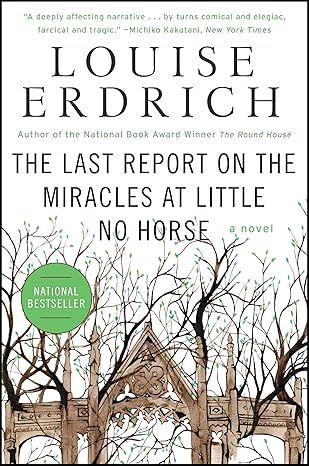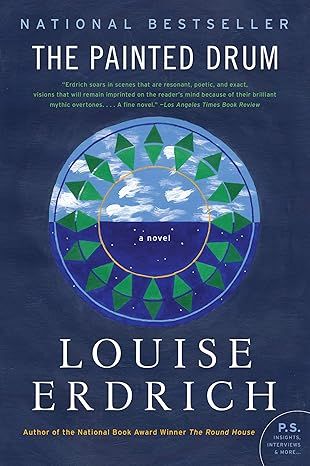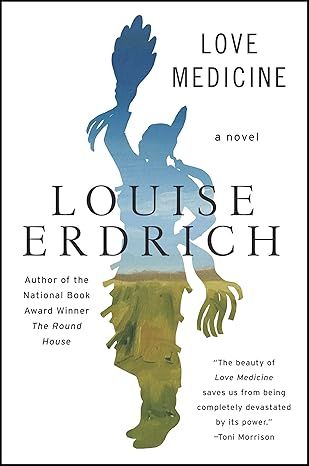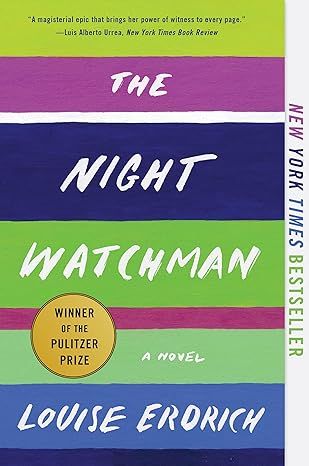The Night Watchman: A Novel
4.4 out of 5
21,822 global ratings
WINNER OF THE 2021 PULITZER PRIZE FOR FICTION
NEW YORK TIMES BESTSELLER
WASHINGTON POST, NPR, CBS SUNDAY MORNING, KIRKUS, CHICAGO PUBLIC LIBRARY, AND GOOD HOUSEKEEPING BEST BOOK OF THE YEAR
Based on the extraordinary life of National Book Award-winning author Louise Erdrich’s grandfather who worked as a night watchman and carried the fight against Native dispossession from rural North Dakota all the way to Washington, D.C., this powerful novel explores themes of love and death with lightness and gravity and unfolds with the elegant prose, sly humor, and depth of feeling of a master craftsman.
Thomas Wazhashk is the night watchman at the jewel bearing plant, the first factory located near the Turtle Mountain Reservation in rural North Dakota. He is also a Chippewa Council member who is trying to understand the consequences of a new “emancipation” bill on its way to the floor of the United States Congress. It is 1953 and he and the other council members know the bill isn’t about freedom; Congress is fed up with Indians. The bill is a “termination” that threatens the rights of Native Americans to their land and their very identity. How can the government abandon treaties made in good faith with Native Americans “for as long as the grasses shall grow, and the rivers run”?
Since graduating high school, Pixie Paranteau has insisted that everyone call her Patrice. Unlike most of the girls on the reservation, Patrice, the class valedictorian, has no desire to wear herself down with a husband and kids. She makes jewel bearings at the plant, a job that barely pays her enough to support her mother and brother. Patrice’s shameful alcoholic father returns home sporadically to terrorize his wife and children and bully her for money. But Patrice needs every penny to follow her beloved older sister, Vera, who moved to the big city of Minneapolis. Vera may have disappeared; she hasn’t been in touch in months, and is rumored to have had a baby. Determined to find Vera and her child, Patrice makes a fateful trip to Minnesota that introduces her to unexpected forms of exploitation and violence, and endangers her life.
Thomas and Patrice live in this impoverished reservation community along with young Chippewa boxer Wood Mountain and his mother Juggie Blue, her niece and Patrice’s best friend Valentine, and Stack Barnes, the white high school math teacher and boxing coach who is hopelessly in love with Patrice.
In the Night Watchman, Louise Erdrich creates a fictional world populated with memorable characters who are forced to grapple with the worst and best impulses of human nature. Illuminating the loves and lives, the desires and ambitions of these characters with compassion, wit, and intelligence, The Night Watchman is a majestic work of fiction from this revered cultural treasure.
464 pages,
Kindle
Audiobook
Hardcover
Paperback
Audio CD
First published March 22, 2021
ISBN 9780062671196
About the authors
Louise Erdrich
Louise Erdrich is one of the most gifted, prolific, and challenging of American novelists. Her fiction reflects aspects of her mixed heritage: German through her father, and French and Ojibwa through her mother. She is the author of many novels, the first of which, Love Medicine, won the National Book Critics Circle Award and the last of which, The Round House, won the National Book Award for Fiction in 2012. She lives in Minnesota.
Read more
Reviews
Laura
5
Best read in a long time
Reviewed in the United States on July 5, 2021
Verified Purchase
Writing: 5/5 Characters: 5/5 Plot: 5/5
I’m grasping for words to express how much I loved this book but all the good words — profound, brilliant, amazing, etc. — have been rendered meaningless through overuse. So just think about what they used to mean and apply here.
The novel is based on the experiences of Erdrich’s grandfather, Patrick Gourneau, in his determined fight against the proposed termination of his Turtle Mountain Band of Chippewa named in House Concurrent Resolution 108 passed in August of 1953. Gourneau is fictionalized as Thomas Wazhashk.
While that is the overarching plot line, the story is told as a set of short chapters from various character viewpoints. While the termination fight touches everyone, much of the content covers the progression of individual lives in the community. Pixie Paranteau supports her family with earnings from a job at the new jewel bearing plant; her sister, Vera, has disappeared in the Cities and has been caught in the underbelly of the beast; Wood Mountain is becoming a top boxer, training with Barnes, a local white coach with eyes glued on Pixie; Millie Cloud is in Minneapolis and has authored a study of her father’s reservation which will be useful in the fight against termination; and Thomas spends his nights as the Night Watchman at the plant — struggling to stay awake by writing letters using the Palmer Method ingrained in him at the Indian boarding school. Other characters are ghostly visitors, Mormon missionaries, and various officials from the BIA, congress, and tribal councils.
Erdrich’s characters are wonderful — each one an individual that defies stereotype; each one full of complexities that never descend into entertaining “quirks.” In contrast, we do see the usual stereotypes through the perspective of others — in Barne’s memory of the “luscious” Indian girls depicted in ads and earnest lectures given by the missionaries, for example.
What I love most about this book is Erdrich’s articulation of the feelings, perspectives, and philosophies of the various characters. Thomas, in his desperation to leverage every possible angle available to him reads the Book of Mormon to better understand the bill’s author — Arthur V. Watkins — a staunch Mormon. He has discussions with Barnes about why Indians can’t / don’t want to become “regular” Americans and why Barnes could never “become” an Indian. He is immensely philosophical, and we are treated to his thinking, his process, and his growing understanding of life and his part of this world. Every chapter is full of enlightening description and presence. I wish I could articulate what Erdrich has done — luckily, she could and did.
This is the best book I’ve read in a long time and by far my favorite Erdrich book. The Pulitzer committee definitely got it right this time.
Some quotes: “This termination bill. Arthur V. Watkins believed it was for the best. To uplift them. Even open the gates of heaven. How could Indians hold themselves apart, when the vanquishers sometimes held their arms out, to crush them to their hearts, with something like love?”
“Thomas was convinced that he’d destroyed their chances. He couldn’t point out exactly how he’d done it, but he knew. And the other thing. The senator had also asked every single Indian person who testified about their degree of Indian blood. The funny thing was, nobody knew exactly.”
“Especially Senator Watkins. The word supercilious. That was the word for every detail. Watkins’ coin-purse mouth. His self-righteous ease. The way he held himself, giving off that vibration. Filling the air with sanctimony. Another word that flung itself into her mind.”
“She was inhabited by a vengeful, roiling, even murderous spirit. The same spirit had hatched the bird that pecked Bucky’s face. When she got home, she’d clean up the sweat lodge and ask her mother to help her get rid of these thoughts.”
“All were cast together onto allotments, to break apart the earth, to learn the value of a dollar, and then how to make one dollar into many dollars and cultivate the dollar into a way of life.”
“His father was so very old now that he slept most of the day. He was ninety-four. When Thomas thought of his father, peace stole across his chest and covered him like sunlight.”
“To most of their neighbors, Indians were people who suffered and hid away in shabby dwellings or roamed the streets in flagrant drunkenness and shame. Except the good ones. There was always “a good Indian” that someone knew.”
“For days. he’d tried to make sense of the papers, to absorb their meaning. To define their unbelievable intent. Unbelievable because the unthinkable was couched in such innocuous dry language. Unbelievable because the intent was, finally, to unmake, to unrecognize. To erase as Indians him, Biboon, Rose, his children, his people, all of us invisible and as if we never were here, from the beginning, here.”
“Emancipation. This word would not stop banging around in his head. Emancipated. But they were not enslaved. Freed from being Indians was the idea. Emancipated from their land. Freed from the treaties that Thomas’s father and grandfather had signed and that were promised to last forever. So as usual, by getting rid of us, the Indian problem would be solved.”
“He wasn’t one for giving names to things. Or finding their basis. His feelings were like weather. He just suffered or enjoyed them.”
“He felt it coming. Wanted to duck. Winced. A sensation like when he was chastised at school gripped him. Like when he went into a bank or bought something expensive in an off-reservation town. Their looks pressing down on him. Their words flattening him. Their eyes squeezing him. Isey, for shame. As his mother used to say. But it was so much worse in English, the word shame.” It made him curdle inside. And the curdling became something hard in his stomach. Or a thought that stabbed so hard he might cast it out in a flare of anger. Or it might stay in there hardening even further until it flew up to his brain and killed him.”
Read more
20 people found this helpful
Carol
5
Historically accurate and well researched, riveting, relevant, endearing--a #MustRead
Reviewed in the United States on October 25, 2023
Verified Purchase
Historical fiction from the point of view of a minority: this is a Pulitzer-winning, best-selling novel by a big-house publisher, by an acclaimed author, and "The Night Watchman" lives up to the acclaim.
Erdrich captures sensory details, family history, tribal traditions, politics, friends, neighbors, relatives, hardships, deprivations, resourcefulness, despair, and more. It's endless, the list of all that Erdrich does right as a writer.
Having survived a few years of fiction workshopping, I can attest that a lot of critics would complain about too many characters, POV (Point of View ) "violations," omniscient narration, some trivial syntax issues (involving commas + and in a series, but I may be the last editor on the planet who cares), perhaps excessive use of sentence frags (at some point, incomplete sentences became trendy and acceptable), but the vast majority of readers do not care how well a novel is written. Do we like the characters? Do we care about them?
Thomas is 100% lovable. Patrice ("not Pixie!") is harder to love, but she earns our respect, she who can chop wood and verbally eviscerate men. Wood Mountain, the young boxer, is endearing. Every character is well drawn, authentic, and memorable. The two Mormon missionaries are intriguing, and the real-life Senator Arthur V. Watkins is a despicable, nasty man. We can rejoice that he failed in his mission to de-tribalize the tribes.
Reading this story, one wonders how it is that Native Americans continue to get the short end of the stick and the least amount of media attention. E.g., the hashtag "Native Lives Matter" came before the #BLM hashtag, and two women actually protested in public that Natives had started usurping "their" hashtag. No, ladies, they had the hashtag first, but you never bothered to learn that, or learn why they saw a need to say their lives matter.
The sex trafficking, the men who pay money to watch women perform (mermaid or blue ox costume in a tank of water, it's too ridiculous to fathom), the poverty, the drug addicts in the city, the exploitation: Erdrich covers just about every issue of the day.
This is a heartbreaking read, but engaging, and ultimately uplifting. This is one of the few novels that make my #MustRead list, one I'd buy for friends and beg them to read.
Read more
9 people found this helpful
Alsia K. Aze
5
So good. loved to learn more of the history and culture of native Americans
Reviewed in the United States on August 4, 2024
Verified Purchase
The story really sucked me in. I’ve read short stories and a novella from this author before and enjoyed reading a full-length novel from her. I wish there was more of an ending for Patrice, she was such a central figure and I wanted her story to continue. Beautiful writing, look forward to reading more from Erdrich.
Jay A. Nesbit
5
It's a compelling read that left me thinking long after I turned the last page.
Reviewed in the United States on July 25, 2024
Verified Purchase
I recently finished reading "The Night Watchman" by Louise Erdrich, and it was a great experience. The book is based on Erdrich's grandfather, who fought against Native American displacement in the 1950s. The characters are really well-drawn, and the story is both moving and eye-opening.
I especially enjoyed the way Erdrich weaves historical events with personal stories. It makes the book feel rich and real. If you're into stories that mix history with deep, personal narratives, you'll probably like this one too. It's a compelling read that left me thinking long after I turned the last page.
Read more
Michael H. Tidemann
5
The Night Watchman moving and inspiring
Reviewed in the United States on February 25, 2023
Verified Purchase
The Night Watchman by Louise Erdrich is a captivating novel by Louise Erdrich, based on her grandfather Patrick Gourneau’s successful fight to ward off efforts to “emancipate” the Turtle Mountain Band of Chippewa of North Dakota. At the heart of the story is Thomas Wazhashk, humble night watchman in a jewel bearing plant. Thomas unearths the real intent of federal legislation that would disenfranchise the Turtle Mountain Chippewa from their land and way of life. Another major character is Patrice ‘Pixie’ Paranteau, a young woman just coming of age who works in the same plant as her uncle Thomas and who is the object of the affections of local high school math teacher and coach ‘Hay Stack’ Barnes. It is not Hay Stack who draws Patrice’s affections, though, but Wood Mountain, Hay Stack’s prize protégé and boxer. Barnes persuades Wood Mountain to take part in a grueling fight with the gate receipts going toward paying for a Turtle Mountain delegation who travel to Washington, D.C., to fight the termination bill written by Senator Arthur W. Watkins. Patrice is also driven to learn what happened to her sister Vera who disappeared in Minneapolis, leaving her baby with friends. Through the course of learning what happened to her sister, Patrice experiences life as a ‘waterjack’ in a seedy nightclub. By her own fierce vigilance she fights off the same forces that sent her sister into the arms of human traffickers. Millie Cloud, a graduate sociology student, a secondary character, also plays an important role in the novel. Millie’s research of the Turtle Mountain people is key in the delegation’s presentation to Washington lawmakers. All but completely absorbed into white culture, Millie rediscovers her Chippewa roots and, like her fellow warriors, fights for the rights of her people. Patrice joins the delegation to Washington, only to return to discover that Wood Mountain has found someone else to take her place – someone else very important to her. Erdrich accomplishes many things in this novel. She weaves seemingly disparate strands into a tightly woven rope at the end. She also shows how common people can accomplish great things when they work together. And, perhaps even greater, she shows the resilience of the Chippewa people and their refusal to be daunted. This is a wonderfully inspiring novel by a master storyteller who will draw you in and not let you go until the very end.
Read more
30 people found this helpful
Hestia Rose
5
Fascinating and heartfelt
Reviewed in the United States on November 26, 2023
Verified Purchase
The look into reservation life in The Night Watchman is utterly fascinating and captivating from beginning to end. The characters’ relationships with each other as both community and family grabbed me, and I really cared about them and cheered at the surprisingly happy ending. The look into indigenous culture and its connection to nature, among other things, was also a treat. The book was also surprisingly funny and vulgar at times in ways that served the story and really helped the characters feel alive. I also loved Patrice’s brief section in Minneapolis. I was terrified the whole way through for her and her sister’s safety.
The one criticism I have (spoilers from here) is that I was underwhelmed by the conclusion to Vera’s storyline. She just found some random old guy and made it home completely independent of Patrice’s search for her. Her relationship with Wood Mountain also gets little to no buildup, so their plans to get married come almost out of nowhere.
I enjoyed the rest of the book so much, however, that it still gets five stars from me.
Read more
Amazon Customer
5
Another Louise Erdrich wonder
Reviewed in the United States on July 20, 2024
Verified Purchase
Ms Erdrich has an amazing sense of how people behave in an ancient subculture. I always end her books thinking that I understand the Chippewa, which of course I don’t, but it’s a great feeling nonetheless.
Aran Joseph Canes
4
The Past is Not Only Alive it’s not even Past
Reviewed in the United States on March 7, 2020
Verified Purchase
The Night Watchman is an impressive literary feat. Written to preserve the memory of the US government’s attempt to close Indian reservations in the 1950s, only a small part of the book is actually devoted to narrating this controversy.
Instead it mostly focuses on the struggles of a young Native American woman. Can she find her lost sister, what is her romantic future, what to do with her deadbeat father, etc.
Through these interwoven narratives, Erorich breathes life into an Indian reservation in the post war era. It’s not an idealized image: poverty, violence and alcoholism do run rife throughout the text.
But it is a proud community conscious of a tradition and culture that long predates the European settlement.
And this is where the text is most impressive. In terse and uncomplicated prose, the story unfolds as if the imagined universe of the tribe is real. Just as Christian literature may cast angels and demons as characters, The Night Watchman makes the spirits, mythologies and shamanism not just literary ornaments but key drivers of the story. Look, for example, to the characters’ participation in the tribe’s creation myth, the presence of benign and malignant ghosts and the way shamanism is able to reveal key plot elements.
Given the extent to which cultural genocide has been perpetrated against Indian heritage, this is a much needed act of preservation. In some ways, The Night Watchman continues the effort of the characters to preserve their reservations; the book becomes a means by which Indian culture can be preserved and transmitted.
In short, crisp prose combined with a deep grounding of the book in a tribe’s collective imagination makes for a book worth reading.
Read more
247 people found this helpful
San Diego Stoke
4
Important Book on the Plight of Native Americans in 50s
Reviewed in the United States on July 11, 2024
Verified Purchase
It took a while to get "locked in," but eventually, I felt this was a worthy read.
STwilight
3
It was good, but I expected a bit more
Reviewed in the United States on December 18, 2023
Verified Purchase
I was drawn to this book as it was selling for a special price and because it was a Pulitzer Prize winning book. I wanted to like this a bit more for that reason. The book is basically vignettes with numerous characters wrapped into a larger story. There are two main storylines which I think could have been separated and told on their own-a story based on historical fiction regarding laws which Congress was trying to pass in the 1950s regarding Native American tribes and forced assimilation. The other was a story about a young woman who disappeared and her sister's quest to look for her. That storyline ended somewhat abruptly, and the sister eventually comes back home by just showing up. We never really found out what happened to her or why she was in that situation. I really liked Patrice, and she was a compelling character. I also liked that Louise had a component of spirituality to the book because it is an integral part of Native American life. I even appreciated the addition of some minor characters such as the Mormon missionaries, because it represented unwanted individuals entering their land and trying to interfere with their longstanding culture. Although, there was an additional storyline on them, which is where the book somewhat lost me. I did not think it was important to look into their lives, nor did I find it necessary to have storylines for minor characters. I suppose this is what Louise was going for-a comprehensive look into the lives of a Native American community. However, I think the choice to tell one or two specific stories in depth were missed here. Also, although we learned the endings for the characters, it really wasn't a satisfying conclusion. I realize that sometimes in life, there are not happy endings but one character in particular did not really have the fate that you would have wanted. The stories were completed, which I appreciate, and we were not left hanging. So, that was good. I just think a lot of the action happened at the end and the book was filled with so many unnecessary stories. Louise Erdrich is a good storyteller but I wasn't in love with this book.
Read more
2 people found this helpful
Top Louise Erdrich titles

The Last Report on the Miracles at Little No Horse: A Novel (P.S.)
4.5
-
1,390
$1.51

The Master Butchers Singing Club: A Novel
4.3
-
1,437
$1.96

The Painted Drum: A Novel (P.S.)
4.4
-
963
$1.74

The Round House: A Novel
4.3
-
12,057
$3.88

Love Medicine: Newly Revised Edition (P.S.)
4.3
-
1,019
$11.99

The Sentence: A Novel
4.3
-
8,450
$2.99
Best Sellers

The Tuscan Child
4.2
-
100,022
$8.39

The Thursday Murder Club: A Novel (A Thursday Murder Club Mystery)
4.3
-
155,575
$6.33

Sapiens: A Brief History of Humankind
4.6
-
140,302
$13.49

The Butterfly Garden (The Collector, 1)
4.3
-
88,556
$9.59

Things We Hide from the Light (Knockemout Series, 2)
4.4
-
94,890
$11.66

The Last Thing He Told Me: A Novel
4.3
-
154,085
$2.99

The Perfect Marriage: A Completely Gripping Psychological Suspense
4.3
-
143,196
$9.47

The Coworker
4.1
-
80,003
$13.48

First Lie Wins: A Novel (Random House Large Print)
4.3
-
54,062
$14.99

Mile High (Windy City Series Book 1)
4.4
-
59,745
$16.19

Layla
4.2
-
107,613
$8.99

The Locked Door
4.4
-
94,673
$8.53

